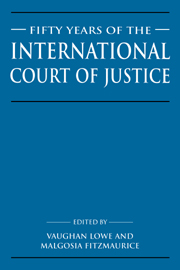Book contents
- Frontmatter
- Contents
- List of contributors
- Preface
- List of abbreviations
- Sir Robert Yewdall Jennings, by Vaughan Lowe
- List of publications of Sir Robert Jennings
- Table of cases
- Part I The International Court of Justice
- Part II The sources and evidences of international law
- Part III Substance of international law
- Part IV Procedural aspects of the work of the International Court of Justice
- 21 Procedural law and the International Court of Justice
- 22 The President of the International Court of Justice
- 23 Nationality of claims: some relevant concepts
- 24 The plea of domestic jurisdiction before the International Court of Justice: substance or procedure?
- 25 ‘Partial’ judgments and the inherent jurisdiction of the International Court of Justice
- 26 Intervention before the International Court of Justice
- 27 The use of Chambers of the International Court of Justice
- 28 The use of experts by the International Court of Justice
- 29 Provisional measures
- 30 Remedies in the International Court of Justice
- 31 A comment on the current health of Advisory Opinions
- Part V The International Court of Justice and the United Nations
- Index
24 - The plea of domestic jurisdiction before the International Court of Justice: substance or procedure?
Published online by Cambridge University Press: 02 November 2009
- Frontmatter
- Contents
- List of contributors
- Preface
- List of abbreviations
- Sir Robert Yewdall Jennings, by Vaughan Lowe
- List of publications of Sir Robert Jennings
- Table of cases
- Part I The International Court of Justice
- Part II The sources and evidences of international law
- Part III Substance of international law
- Part IV Procedural aspects of the work of the International Court of Justice
- 21 Procedural law and the International Court of Justice
- 22 The President of the International Court of Justice
- 23 Nationality of claims: some relevant concepts
- 24 The plea of domestic jurisdiction before the International Court of Justice: substance or procedure?
- 25 ‘Partial’ judgments and the inherent jurisdiction of the International Court of Justice
- 26 Intervention before the International Court of Justice
- 27 The use of Chambers of the International Court of Justice
- 28 The use of experts by the International Court of Justice
- 29 Provisional measures
- 30 Remedies in the International Court of Justice
- 31 A comment on the current health of Advisory Opinions
- Part V The International Court of Justice and the United Nations
- Index
Summary
INTRODUCTION
The Cases in which the issue of domestic jurisdiction has arisen before the ICJ have been, so far, Anglo-Iranian Oil Co., Interpretation of Peace Treaties with Bulgaria, Hungary and Romania, Norwegian Loans, Rights of Passage over Indian Territory, Interhandel and Aerial Incident. The Court has pronounced itself conclusively on the plea in Interpretation of Peace Treaties, Right of Passage and Interhandel. Of the other cases, Norwegian Loans is interesting for the subject of the present chapter in view of opinions expressed by five dissenting judges. Although they are not devoid of interest we must leave out, for the sake of brevity, Anglo-Iranian Oil Co. and Aerial Incident.
A study of the said jurisprudence indicates with clarity, in our view, that although the Court, the parties, the single judges and commentators continue to refer, explicitly or implicitly, to the traditional concept of domestic jurisdiction, that concept does not seem to have played any effective role in determining the acceptance or the rejection of the objections based on domestic jurisdiction.
By the ‘traditional concept’ I understand that ‘international law criterion’ which was resorted to by the practice and doctrine of international adjudication as soon as it became clear to almost all that one could not find any matters belonging per se – namely, by their nature – to the domestic jurisdiction of states.
- Type
- Chapter
- Information
- Fifty Years of the International Court of JusticeEssays in Honour of Sir Robert Jennings, pp. 440 - 464Publisher: Cambridge University PressPrint publication year: 1996
- 2
- Cited by



